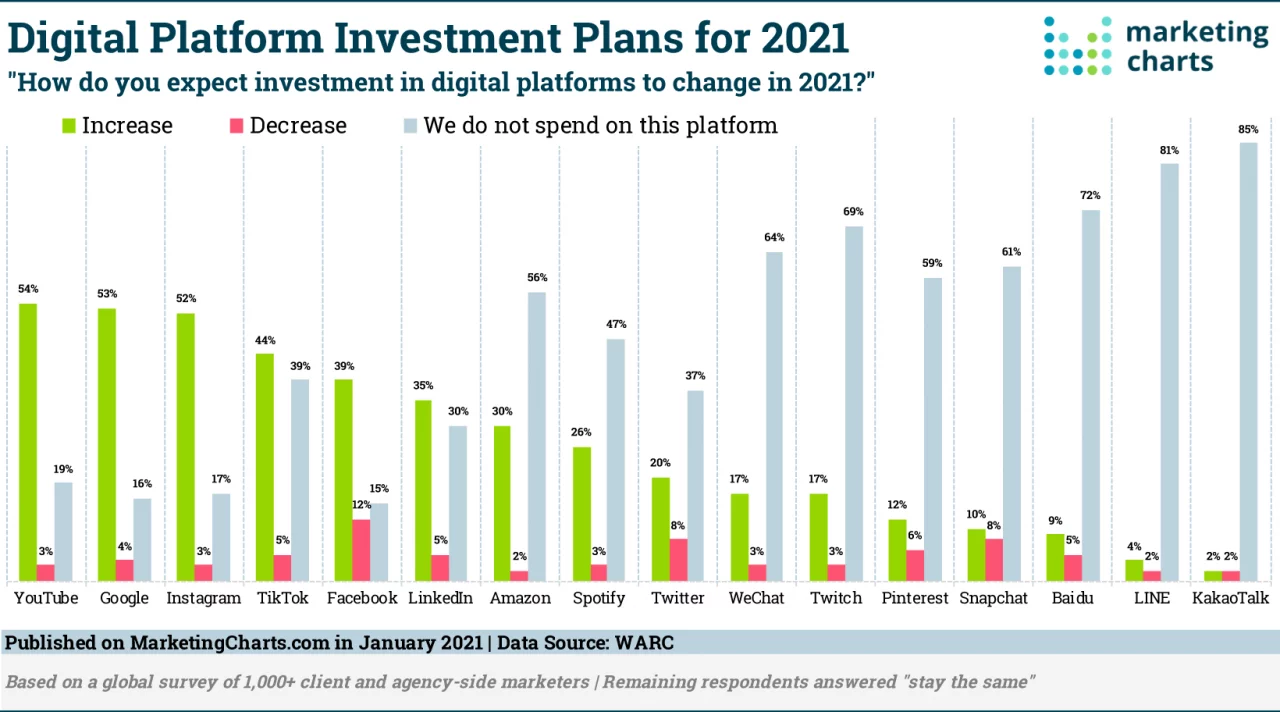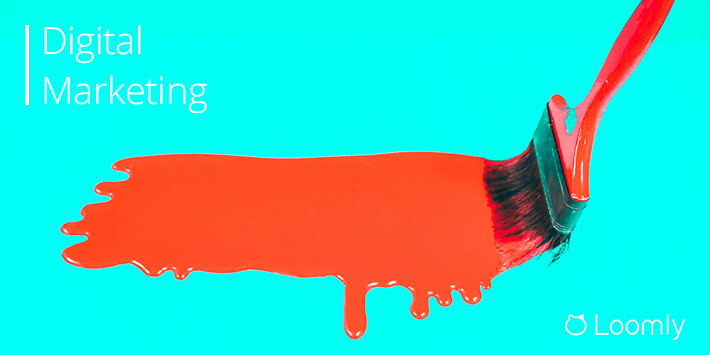Digital Marketing FAQ
Digital marketing spend is on the increase.
Whether it’s online video (70%), mobile marketing (64%), online search (59%), or online display (49%), digital marketing budgets are rising:

Source: Marketing Charts
But what are the pros and cons of digital marketing? And what are the common mistakes you should avoid?
Read on as the Loomly Team answers all your burning questions in this Digital Marketing FAQ.
TABLE OF CONTENTS
- What is digital marketing?
- What are the types of digital marketing?
- Why is digital marketing important?
- What are the pros and cons of digital marketing?
- What are the most common digital marketing mistakes?
- How much does digital marketing cost?
- How do you implement a digital marketing strategy on a budget?
- How do I become a digital marketer?
What is digital marketing?
Digital marketing, also called online marketing, is the promotion of products and services via digital technologies, including the internet and other forms of digital communication.
Brands use digital channels such as search engines, social media, email, online advertising, and mobile (text and multimedia) messages to connect with current and prospective customers.
Note: Traditional marketing uses channels such as billboards, direct mail, printed newspapers, and magazines.
In short: if a marketing campaign involves digital communication, it’s digital marketing.
What are the types of digital marketing?
These are the main types of digital marketing:
- Search engine optimization
- Pay-per-click
- Social media marketing
- Content marketing
- Email marketing
- Mobile marketing
- Marketing analytics
Why is digital marketing important?
Here are eight reasons why digital marketing is important for brands today.
Digital marketing lets you:
- Reach people where they spend their time and money.
- Target only the prospects most likely to purchase your product or service.
- Increase ROI as it’s more cost-effective than traditional marketing.
- Outrank competition and level the playing field for small businesses in your industry.
- Measure more metrics, such as:
- Website traffic
- Content performance and lead generation
- Attribution modeling
- Scale and adapt campaigns to your audience size.
- Segment, automate, and personalize your marketing campaigns.
- Establish a rapport with your audience.
What are the pros and cons of digital marketing?
Here are some of the pros and cons of digital marketing.
Digital marketing has several positives, including:
- Digital marketing provides access to a vast audience and the capability for super-specific targeting.
- Digital marketing offers superior tracking and metrics.
- Digital marketing’s exposure is expanding.
- Digital marketing is cheaper to implement and maintain than many traditional marketing methods.
- Digital marketing is customizable and enables better A/B testing and personalization.
- Digital marketing gives you access to social media.
- Digital marketing gives you access to new technologies like AI and machine learning.
Digital marketing also has its drawbacks, including:
- Digital marketing can have a low impact from a visual standpoint.
- Digital marketing can lead to content and email overload.
- Digital marketing can be mimicked for fraudulent activities.
- Digital marketing can exacerbate a bad experience and poor reviews via social media.
What are the most common digital marketing mistakes?
Here are 24 digital marketing mistakes that people make every single day:
- Forgetting about mobile users
- Never offering discounts or promotions
- Not having a blog for your website
- Avoiding social media
- Forgetting to use videos
- Not measuring ROI
- Targeting everyone
- Not commenting on blogs
- Not optimizing your website for speed
- Spamming customers
- Not converting web traffic to customers
- Disregarding abandoned shopping carts
- Not using SEO
- Turning down guest posts
- Not using lead validation
- Poor personalization techniques
- Overlooking email marketing
- Not using a call-to-action
- Focusing on acquisition instead of retention
- Trying to do it all alone
- Poor budgeting
- Not setting goals
- Providing subpar customer service
- Not promoting your website
How much does digital marketing cost?
Several factors determine how much digital marketing costs, including:
- Business size
- Marketing objectives
- Marketing budget
- Timeline
According to a study conducted by Brafton, on average, businesses spend 11.2% of revenue on digital marketing. But any investment between 10-20% of income is the norm.
A rough estimate of the top three types of digital marketing costs are:
- Search engine optimization: $1,000-$7,500
- Social media advertising: $4,000-$7,000
- Pay-per-click advertising: $9,000-$10,000
How do you implement a digital marketing strategy on a budget?
Here are 20 frugal strategies you can use to implement digital marketing on a budget (and maximize your ROI):
Paid channels:
Social advertising
- Install the Meta Pixel
- Run Facebook Ads on a small budget
- Run Instagram Ads on a small budget
Search advertising
- Run Google Ads on a small budget
Organic channels:
SEO content marketing
- Start with an SEO audit
- Perform keyword research
- Publish valuable content on your blog
Email marketing
- Email your subscribers
- Use an email signature
Social media marketing
- Focus on the most relevant social networks for your brand
- Run one experiment at a time
- Explore new networks
- Repurpose your existing content
- Remember to tag your products
- Refine your social media workflow
- Participate in social groups, communities, and forums
Relationship marketing
- Use influencers to promote your brand
- Comment on relevant content
- Guest post on industry blogs
- Contribute to HARO as an expert
How do I become a digital marketer?
Here are seven ways to become the best digital marketer:
- Attend networking events
- Learn from digital marketing brands and entrepreneurs
- Connect with like-minded individuals
- Find a digital marketing internship
- Become a member of a professional body
- Stay up to date on the state of digital marketing
- Practice continuous learning

Manage all your social media accounts in one place.
Craft, schedule, & auto-post content to all your social channels, then track analytics and manage interactions from a single, easy-to-use dashboard.
Digital Marketing in a Nutshell
Digital marketing is the most popular form of marketing that you can use to promote your products and services. You can use both paid and organic channels to reach your prospects and customers, but make sure you avoid the most common pitfalls.



